

Rio de Janeiro
(The World Social Forum took place in Porto Alegre, Brazil, in January 2003. I attended with a Global Exchange delegation. The trip began with several days in Rio de Janeiro exploring issues of socio-economic inequalities. This is a report on the first part of the trip; the Porto Alegre part is also available.)

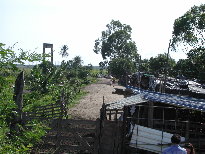 January 19, 2003. We visited the Terra Prometida (Promised Land) Movimento dos
Trabalhadores Rurais Sem Terra (MST, Landless Workers Movement) settlement at Santa Cruz in the
state of Rio de Janeiro. On November 28, 1999, unemployed migrants to the city of Rio de Janeiro
occupied 1200 hectares of land from an old colonial fazenda (landed estate) that has been abandoned
for 30 years. Many of the community members are children of farmers who came to the city looking
for jobs and a better life, but instead were expelled to the margins of society. Together they are
working to improve their lives and those of their children.
January 19, 2003. We visited the Terra Prometida (Promised Land) Movimento dos
Trabalhadores Rurais Sem Terra (MST, Landless Workers Movement) settlement at Santa Cruz in the
state of Rio de Janeiro. On November 28, 1999, unemployed migrants to the city of Rio de Janeiro
occupied 1200 hectares of land from an old colonial fazenda (landed estate) that has been abandoned
for 30 years. Many of the community members are children of farmers who came to the city looking
for jobs and a better life, but instead were expelled to the margins of society. Together they are
working to improve their lives and those of their children.
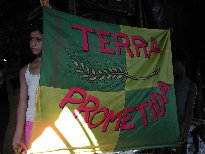

The MST formed in the late 1970s during the military dictatorship to defend the rights and lives of peasants who had been expelled from their lands. Originally rooted in the Pastoral Land Commission of the Catholic Church, in separated in the mid-1980s to form its own organization. Today it has grown into one of Brazil's largest and strongest social movements. It operates in 23 of Brazil's states and exerts a positive influence on governmental policy.
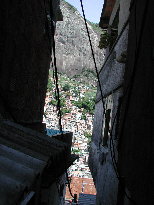
January 20, 2003. Today we visited with the Ação Social Padre Anchieta (ASPA, Padre Anchieta Social Association), a non-profit community organization that works in Rocinha. ASPA engages in socio-educative, cultural, and religious work with the objective to elevate the quality of life of poor people in Rio de Janeiro, especially in Rocinha. Founded by the Jesuits in 1960, it is one of the oldest such organizations working on social projects in Rio.
Rocinha (which means "little plantation" or "garden" in Portuguese), began as a favela (slum) on the outskirts of Rio about 50 years ago. It housed immigrants, largely from the impoverished northeast area part of Brazil who came to Rio looking for a better life. Instead of finding better living conditions, they were pushed to the margins--living in shacks on the hillsides around Rio without basic services.
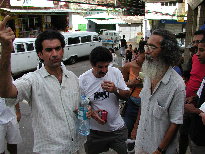
Today Rocinha is one of Rio's biggest neighborhood communities, with almost one million inhabitants. Together the community has made great strides working on such communal projects as schools, police, potable water, sanitation services, and community radio. In addition they have set up a popular bank that offers small loans to community members at low interest rates. One of the biggest issues they continue to work on is securing property rights for community members so that they don't lose their houses in which they live. In addition, the moist air of Rio combined with a lack of ventilation in the houses built on top of each other results in high rates of TB.
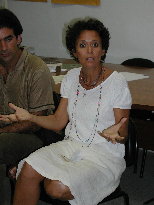
January 21, 2003.
The Instituto Brasileiro de Análises Sociais e Econômicas
(iBase, Brazilian Institute of Social
and Economic Analyses) is a non-governmental think tank founded in 1981 during the military
dictatorship to work on economic and social issues. It works with social organizations to give a
voice to poor people. Brazil has the greatest inequality of wealth in the world; 1 percent of the
population owns half of the country's wealth. Implementing democratic structures such as elections
is only half of the process in democraticizing a country. In Brazil, this process is limited by
extreme socio-economic inequalities. To address these problems, iBase is working in four main areas:
transparency and social accountability participatoin and sustainable local development, public
policies and globalization, and processes of social inclusion.
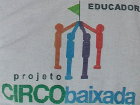
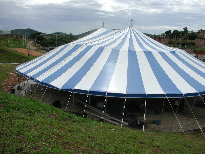 January 22, 2003. The Projeto Circo Baixada (Lowland Circus Project) is a street children's
circus sponsored by Se Essa Rua Fosse Minha (If These Streets Were Mine) in the town of Queimados,
about an hour outside of Rio de Janeiro. It is a project designed to provide an alternative to
drugs and other street problems. According to the organizers, street children naturally make
acrobatic moves on the streets so the transition to a circus is easy. Circuses are traditionally
family affairs, and so the project helps to build family ties that otherwise may be missing from a
street child's life.
January 22, 2003. The Projeto Circo Baixada (Lowland Circus Project) is a street children's
circus sponsored by Se Essa Rua Fosse Minha (If These Streets Were Mine) in the town of Queimados,
about an hour outside of Rio de Janeiro. It is a project designed to provide an alternative to
drugs and other street problems. According to the organizers, street children naturally make
acrobatic moves on the streets so the transition to a circus is easy. Circuses are traditionally
family affairs, and so the project helps to build family ties that otherwise may be missing from a
street child's life.
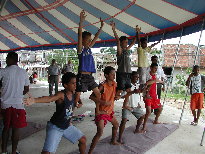 Rio de Janeiro
has about 1200 street children, and this program works with about 300 kids each year. Since its
founding in 1991, 3000 people have gone through the program. The program has been largely successful,
with some kids returning to the streets with more and better skills, others returning to their
families, and others getting married and starting a new life on their own. Outside of the program,
street kids often fall into a drug economy, with many of them dead by the time they are 25 years
old. Police have been known to hassle and kill the street children, and if they fall on the bad side
of a drug trafficker they might be executed with an "African Necklace" (burning tires placed around
a body). To counter negative stereotypes of street children, this program also conducts activities
like selling postcards of street children conducting circus acts by famous Rio landmarks in an
attempt to foster postive images.
Rio de Janeiro
has about 1200 street children, and this program works with about 300 kids each year. Since its
founding in 1991, 3000 people have gone through the program. The program has been largely successful,
with some kids returning to the streets with more and better skills, others returning to their
families, and others getting married and starting a new life on their own. Outside of the program,
street kids often fall into a drug economy, with many of them dead by the time they are 25 years
old. Police have been known to hassle and kill the street children, and if they fall on the bad side
of a drug trafficker they might be executed with an "African Necklace" (burning tires placed around
a body). To counter negative stereotypes of street children, this program also conducts activities
like selling postcards of street children conducting circus acts by famous Rio landmarks in an
attempt to foster postive images.
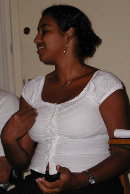 Criola is a 10-year-old non-governmental organization in Rio de Janeiro which strives to create a safe environment
for Afro-Brazilian women. It does this through three programs: arts and handicrafts which shows the
women's work in fairs; health which works to prevent AIDS and other diseases; and "Ziza," a women's
rights program that works to end domestic abuse and puts on theater productions on human rights. In
particular, Criola works on issues of self esteem and attempts to validate African culture in Brazil.
Criola is a 10-year-old non-governmental organization in Rio de Janeiro which strives to create a safe environment
for Afro-Brazilian women. It does this through three programs: arts and handicrafts which shows the
women's work in fairs; health which works to prevent AIDS and other diseases; and "Ziza," a women's
rights program that works to end domestic abuse and puts on theater productions on human rights. In
particular, Criola works on issues of self esteem and attempts to validate African culture in Brazil.
On the evening of January 22, we flew to Porto Alegre.
